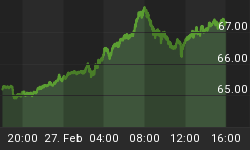Captive over-reliance on the United States means that international markets are hesitant to accurately discount the future costs of war, natural resource shortfall, lost manufacturing base, and terror. The value of dollar denominated assets are much too high to be realistic to risk and reality. Adjustments have not occurred because a large dependency on US GDP means that US markets and assets have artificial staying power.

Department of Energy
Graph Editor: Energy and Wealth as Centers of Gravity
We know that on worldwide basis common political interests have broken down. Economic ties, interdependence, and interrelationships are a bit more sticky. However, the global economy has no choice but to follow the political tone that has been set to conclusion. To date, the magnitude of global dependency means that orderly exit out of US dominated institutions and US denominated assets may be impossible.
For now, the ranchers governing the global economy know they cannot afford to have the cattle stampede out of the dollar and the DOW. News must not be allowed to tarnish the safety of a peace time facade. Eventually private large money will exit, it may have done so already.
In a fit of fantasy, preserving the status quo means, that everything has to stay the same even though people notice that individual purchasing power for food and energy has visibly eroded through the effects of wartime. Economic and security risks are issues and costs without mention.
As part of a society in denial, the Federal Reserve, and CIA (footnotes), have intentionally misanalysed the war by limiting the definition and scope of this conflict. The events unfolding are global, they are not localized in Iraq, nor can they be contained.
Denial means that the US has limited social, financial, and political commitments to war. This does not mean that global war has not been occurring. Many wars begin unilaterally, with a single aggressor aligned against an unprepared or unwilling enemy.
Because of denial, ultimately more civilians will be adversely effected than direct combatants. Again, beyond 9-11 and Iraq, the first domestic casualty of war has been the recent declination of the US standard of living.
War tends to arbitrate issues between groups of people contending for resources, accessing freedom, and seeking greater allocations of scarce global purchasing power. Ironically standards of living may go down whether or not the war is ever funded.
At least the Federal Reserve realizes in terms of Iraq that "increases in war risk caused a rise in oil prices, a fall in Treasury yields and equity prices, a widening of corporate yield spreads, and a decline in the dollar." By contrast war risk did not have "a significant impact on the price of gold or on the liquidity premium on the ten-year Treasury note." The cattle ranchers have a strong hold on the livestock.
What happens when the scope of this war has been adequately defined? What will the USD be worth? How will gold be priced? What interest rate could provide adequate reward to risk? How will the US cope with its energy needs? Will global transportation and free trade prevail? What are the fundamentals of US purchasing power and living standards? These are some of the questions the arbiter of war will attempt to answer.
The primary objective in the developed world may be continued economic prosperity and stability through the status quo. Politically the stasis of steady state has been abused and broken.
The objective of the lesser franchised may be regional unification, political religion, self determination, and domestic betterment. China Russia and India are better positioned than emerging Pan-Islam, or "Old-Europe."
In a zero sum game, the people who have most to lose will lose the most. This may be especially true because the war and its implications have been poorly defined to kowtow to the economic expectations of the developed world.
Notes:
Many of the traders I speak to point to rallies which occur in the DOW between 1 and 2pm. Do you see these rallies?
Are you aware that Japan can earn 2% in arbitrage with a steady or falling exchange rate?
CIA Fact book regarding Dow 10000
......A major short-term problem in first half 2002 was a sharp decline in the stock market, fueled in part by the exposure of dubious accounting practices in some major corporations. The war in March/April 2003 between a US-led coalition and Iraq shifted resources to the military. In 2003, growth in output and productivity and the recovery of the stock market to above 10,000 for the Dow Jones Industrial Average were promising signs. Unemployment stayed at the 6% level, however, and began to decline only at the end of the year. Long-term problems include inadequate investment in economic infrastructure, rapidly rising medical and pension costs of an aging population, sizable trade and budget deficits, and stagnation of family income in the lower economic groups.
http://www.federalreserve.gov/pubs/feds/2003/200318/200318pap.pdf
The Effects of War Risk on U.S. Financial Markets*
Roberto Rigobon MIT Sloan School of Management and NBER and Brian Sack
Board of Governors of the Federal Reserve System April 23, 2003















